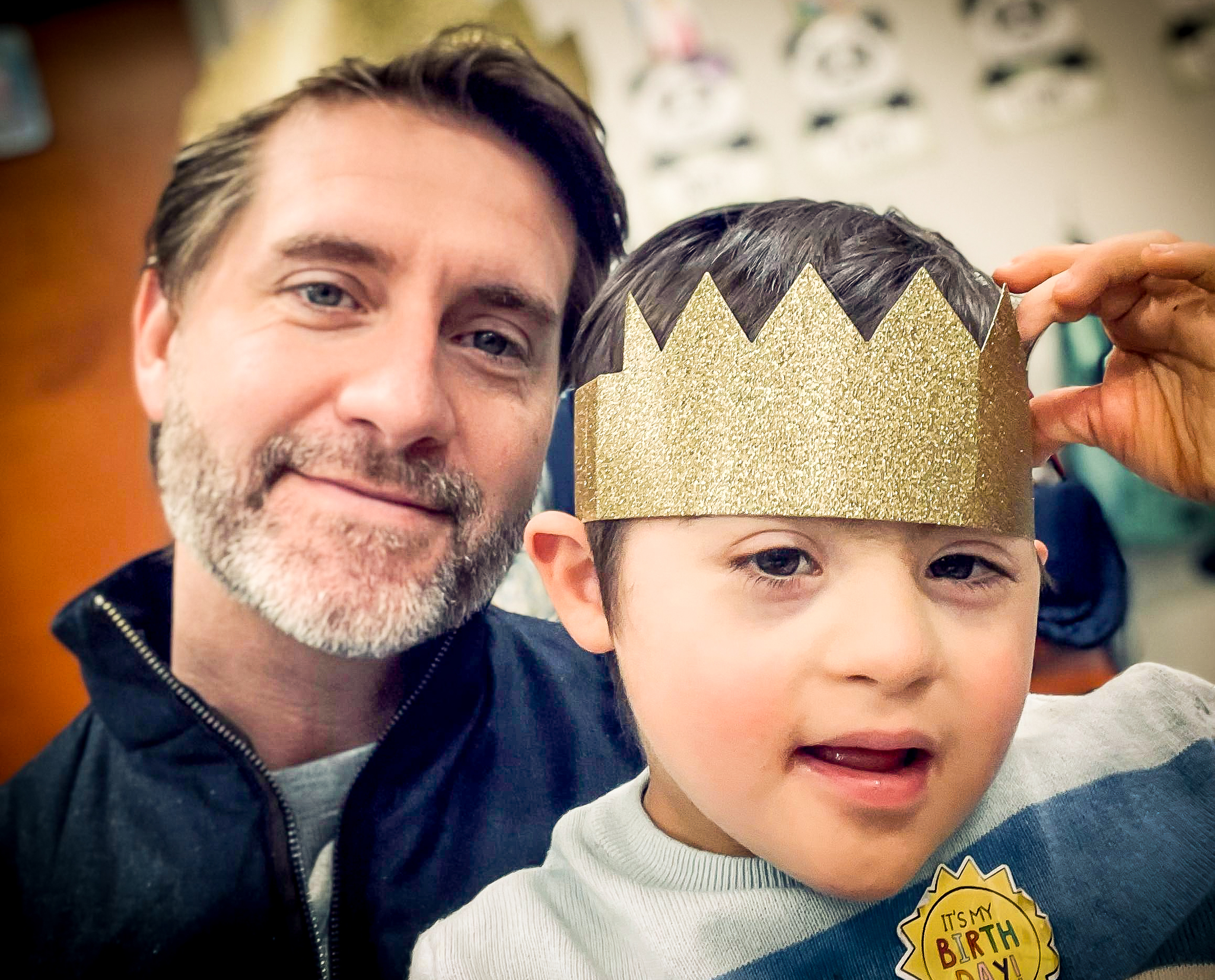He had a different look about him. I had seen other babies, of course—at least three other newborns, if I counted his older siblings and his twin sister—so I knew what “typical” looked like. But Gus didn’t look typical. Something about the shape of his eyes. His tongue protruded a bit. There was a slow manner to his movements. And he didn’t cry. No screaming. No tears, either. He lay there, staring up at the unfamiliarity of a world indifferent to what made him different.
I felt desperate to stop one of the nurses who were buzzing around tending to Gus, then his sister, then to Gus again. I needed to say something. But what? I didn’t know what to say. That something seemed different about him? That I was terrified? That I didn’t think this story was going to be written quite the way I’d like? That a reality quite different than my idealized one was setting in?
“Excuse me, can I ask you something, how many babies have you helped deliver?” I found the courage to ask a nurse.
“Oh, hundreds,” she said.
“My son—he doesn’t look, uh, typical, does he?”
Her countenance changed. “He looks a little different.”
“It’s Down Syndrome, isn’t it?”
“He looks a little different,” she repeated. “Let me go get the doctor.”
The rest of the day felt a bit like writing a story that gets out of hand. I was buried in explanations, confusion, questions, tears, momentary serenity, an echocardiogram, more questions. Then, the answer: Trisomy 21, a.k.a Down Syndrome, a chromosomal anomaly resulting in an extra twenty-first chromosome. Down Syndrome presents as an intellectual disability with developmental delays, distinct physical characteristics, and possible physical defects.
Now, that’s a terrible description of how a child with Down Syndrome actually presents.
There was nothing in all the scientific literature I was inundated with about how free of malice, full of joy, or prone to the most enviable, unashamed play children with Down Syndrome are.
I’d discover all that about Gus, but I’d have to walk through a lot of fear to get there.
Taking home a child with Down Syndrome felt overwhelming. How or what would I be able to teach him? Would I ever be able to have a conversation with him? Babies with Down Syndrome have floppy muscle tone, so how was I even supposed hold him? Would he be accepted? Would other kids be cruel to him? Would he be happy in the life God’s afforded him? How do I steward this life I’ve been entrusted with?
Some questions have answered themselves. Some will just have to be lived. I still find myself looking for someone to stop and ask how I best parent his differences. But I look for that assurance less and less frequently. I mostly just look at Gus now.
He reminds me of the story Jesus tells about the pearl of great price. The kingdom of God is like a merchant seeking precious pearls. He discovers one of great price, and he sells all he has to buy it. I imagine that pearl being covered in dirt, plain and unremarkable to the eye. Easily judged and dismissed, if seen at all. But once found—the sheer joy of such a rare discovery. The finder’s gratitude. The pride that would come from showing others this precious pearl.
I see that discovered beauty in Gus. Not everyone can see it, but I do. I found what others don’t know they’re looking for. The uncertainty of the delivery room has been transformed by a spell, enchanted into the certainty of discovery. I find myself wanting to tell the story of my pearl. If I tell it enough, will people discover what lies beyond what they see?
Gus’s full name is Augustus Stirling James Latta. Augustus after my favorite character in literature and film, Augustus McCrae from Lonesome Dove. Stirling for the city in Scotland. James is a centuries-old Latta name. For me, Gus was a continuation of a story I had in mind. He would be strong. A leader. Formidable. Noble. Augustus Stirling James—I mean, that’s a president’s name!
The story I wanted to tell about him wasn’t the story he had in him. My narrow story couldn’t contain him.
I’m learning that he contains a myriad of stories. I’m reminded of all the stories he holds when I come across others just as good, beautiful, and true.
One night, I discovered The Velveteen Rabbit in a box of books. Our mundane bedtime routine, liturgized by a story and a quick prayer, unearthed a pearl:
“Real isn’t how you are made,” said the Skin Horse. “It’s a thing that happens to you. When a child loves you for a long, long time, not just to play with, but really loves you, then you become Real.”
“Does it hurt?” asked the Rabbit.
“Sometimes,” said the Skin Horse, for he was always truthful. “When you are Real you don’t mind being hurt.”
“Does it happen all at once, like being wound up,” he asked, “or bit by bit?”
“It doesn’t happen all at once,” said the Skin Horse. “You become. It takes a long time. That’s why it doesn’t happen often to people who break easily, or have sharp edges, or who have to be carefully kept. Generally, by the time you are Real, most of your hair has been loved off, and your eyes drop out and you get loose in the joints and very shabby. But these things don’t matter at all, because once you are Real you can’t be ugly, except to people who don’t understand.”[1]
I crumbled a bit as I read. Gus looked up at me with the kind of emotional intelligence I’ve only encountered in children with Down Syndrome.
“Daddy sad?”
“No buddy, Daddy just loves you a lot. You’re helping me become real.”
“Okay, Daddy.”
![]()
I’m forty-one now. My hair is thinning, my face more wrinkled, and I’m stiffer, not looser, in the joints. And I don’t mind the confusion, the fear, the uncertainty. The reality of the story Gus has brought me into, brought to me, is far greater than all that. The truth is, to love and be loved by a differently abled child is to be brought into a different sort of reality. To know a differently abled child is to be brought from a story of unknowing to an invaluable tale of intimacy, from one of fear to one of joy, from uncertainty to peace, and perhaps most importantly, from the illusion of control to the liberation of surrender. By the time you let the story of a differently abled child become yours, you might have lost some hair or become a little looser in the joints, but you’ll have become more real. The pearl of great price might cost you your assumptions and idealized notions of strength, but you’ll have traded what you didn’t need for something you didn’t know you needed so badly.
![]()
This excerpt used with permission from Square Halo Books and comes from Wild Things and Castles in the Sky: A Guide to Choosing the Best Books for Children edited by Leslie Bustard, Carey Bustard, and Théa Rosenburg, published in April 2022.
[1] Margery Williams, The Velveteen Rabbit or How Toys Become Real, illus. William Nicholson (New York: Doubleday, 1922), p. 5.
The illustration of the oak leaf is courtesy of Jordan Durbin and used with her generous permission for Cultivating.
Corey is a poet, writer, speaker, and educator. He holds Master’s Degrees in Religion, English, and Counseling, and a Ph.D. in Literature. He is the author of C. S. Lewis and the Art of Writing, and the forthcoming The Serve the Work: Stray Thoughts on Christ and Creativity. Corey has written articles and given talks on subjects ranging from C. S. Lewis, the theology of creativity, the neurology of the imagination, and the power of story to heal life’s wounds.
Leave a Reply
A Field Guide to Cultivating ~ Essentials to Cultivating a Whole Life, Rooted in Christ, and Flourishing in Fellowship
Enjoy our gift to you as our Welcome to Cultivating! Discover the purpose of The Cultivating Project, and how you might find a "What, you too?" experience here with this fellowship of makers!


Oh my. Your journey is so beautifully broken. Thank you for the transparency. I know some of your story via common friends who have shared but first person through your post was a painful and yet timely gift. Keep writing, posting, and walking along side your son with the grace and love so evident in this offering. Thanks friend.
Probably the single most eloquent description of this journey of ours I’ve ever read. What a joy to read your version!
Corey, what a beautiful account of your journey with Gus. And this: “The pearl of great price might cost you your assumptions and idealized notions of strength, but you’ll have traded what you didn’t need for something you didn’t know you needed so badly.” I love how you share your discovery of how our personal kingdoms are demolished, and how the Kingdom of Heaven arrives. Thank you.
Corey, beautifully written expression of your journey and the amazing insights you’ve gained. Now I’ve gained as well from your poetic telling. Thanks!
Thank you, each, for the encouraging comments.
Hi Corey, I absolutely love this, especially the part of I mostly just look at Gus! The power of the Almighty seems to descend in these children, no matter how old they become, and they are unabashedly bereft of self consciousness and posturing, just children always. It’s a slice cut from the delicious and decadently rich cake of heaven, where only children continually behold the radiant face of their father. I’ve worked with and so loved these children and adults because they put me into a posture of sanctity and learning. They surprise me with the upside downess of reality as we usually see it and I end up catching what they have, more innocence and a love for the real real. I tutor many children on varying difficulties and when they adopt the eye of humbling themselves to learn from me, trusting what I say, I feel the same heavenly vision and ask, “What thing is this?” Thank you for sharing your experience, Kind Horse! Aren’t these gifts from Jesus enough to knock the breath out of us once we really see? I love the, “Daddy sad?” When I volunteered at a camp for differing abilities they used to tell us that the child’s spirit wasn’t disabled and to always speak to who they really were in there. I’ve never forgotten that. I was looking forward to reading your writing in this book but haven’t received my copy yet. Keep the real shining forth, breaking out, spilling over! Can you imagine Jesus, just all real, no fake added whatsoever? Won’t heaven be so fun at last, real real everywhere, drink and drink and drink! Thanks for the free samples, previews , of your love and Gus!!!